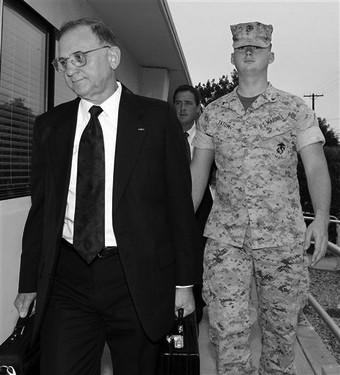On Nov. 19, 2005, a roadside bomb attack killed a U.S. Marine in Haditha, Iraq. Two U.S. Marines are now facing court-martials on charges stemming from the actions they took in response to the attack, which left 24 Iraqi civilians dead.
The Marines involved have been accused of vengefully reacting to the bomb attack by ordering five men out of a nearby car and killing them before killing 19 people in nearby homes, including women and children. Defenders of the Marines’ actions say they reacted to an enemy attack lawfully and in accordance with their training.
Lance Cpl. Stephen B. Tatum has been charged with involuntary manslaughter, reckless endangerment and aggravated assault. Tatum and three other marines were originally to be charged with murder, but it was decided there was insufficient evidence for the charge.
Tatum did kill shoot and kill civilians, but he “did so because of his training and the circumstances he was placed in, not to exact revenge and commit murder,” wrote Lt. Col. Paul Ware, according to the Associated Press.
“Lance Cpl Tatum did not commit any crime, and we will take the fight to the courtroom,” said Tatum’s lawyers in a statement. “We will vigorously challenge the government’s case, and nothing will be left undone in defense of this fine young Marine.”
Lt. Col. Jeffrey R. Chessani, the highest-ranked U.S. serviceman to be court-martialed over a combat incident since the Vietnam war, has been charged with dereliction of duty and violation of a lawful order after failing to adequately investigate an incident that occurred in Haditha in 2005.
“Chessani failed to thoroughly and accurately report and investigate a combat engagement that clearly needed scrutiny,” said Col. Christopher Conlin at Chessani’s preliminary hearing.
Lt. Gen. James Mattis decided on the charges after “consideration of information developed from investigations by Marine, Army and Naval Criminal Investigative Service investigators, as well as evidence produced during an Article 32 investigation hearing,” said the Marines in press release.
An Article 32 investigation is conducted by a commissioned officer to determine whether or not there is enough evidence for a general court martial, as opposed to a less severe disciplinary action.
“The army is trained to kill people and blow stuff up. They’re not trained to be a police force, they’re not trained to rebuild a regime,” said Assistant Professor of Political Science Robert Duncan. “Whether they’re guilty or innocent I have no idea. I don’t know the facts. I don’t even think the military investigators know the facts.”
Charges have been dropped against two other Marines in the case. One other Marine is scheduled for an evidentiary hearing.
Lt. Gen. Mattis has yet to decide whether Staff Sgt. Frank Wuterich will face charges of manslaughter or murder. Wuterich has admitted to killing Iraqi civilians in Haditha, but the Marines have said he was responding to attacks.
“I feel it’s a step in the right direction that the U.S. takes some accountability for its soldiers’ actions in Iraq,” said sophomore peace and conflict studies major Phil Kennedy. “I don’t think that it recognizes that there’s a problem systemically in the army that causes this kind of abuse. It’s not something that a couple of court-martials will fix.”

